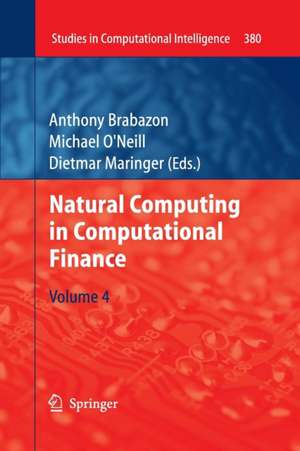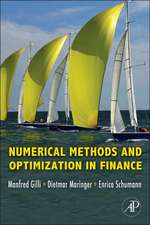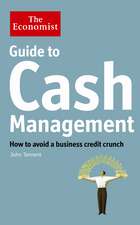Natural Computing in Computational Finance: Volume 4: Studies in Computational Intelligence, cartea 380
Editat de Anthony Brabazon, Michael O'Neill, Dietmar Maringeren Limba Engleză Paperback – 23 aug 2016
which was selected following a rigorous, peer-reviewed, selection process. The chapters illustrate the application of a range of cutting-edge natural computing and agent-based methodologies in computational finance and economics.
The applications explored include option model calibration, financial trend reversal detection, enhanced indexation, algorithmic trading, corporate payout determination and agent-based modeling of liquidity costs, and trade strategy adaptation. While describing cutting edge applications, the chapters are
written so that they are accessible to a wide audience. Hence, they should be of interest to academics, students and practitioners in the fields of computational finance and economics.
which was selected following a rigorous, peer-reviewed, selection process. The chapters illustrate the application of a range of cutting-edge natural computing and agent-based methodologies in computational finance and economics.
The applications explored include option model calibration, financial trend reversal detection, enhanced indexation, algorithmic trading, corporate payout determination and agent-based modeling of liquidity costs, and trade strategy adaptation. While describing cutting edge applications, the chapters are
written so that they are accessible to a wide audience. Hence, they should be of interest to academics, students and practitioners in the fields of computational finance and economics.
The applications explored include option model calibration, financial trend reversal detection, enhanced indexation, algorithmic trading, corporate payout determination and agent-based modeling of liquidity costs, and trade strategy adaptation. While describing cutting edge applications, the chapters are
written so that they are accessible to a wide audience. Hence, they should be of interest to academics, students and practitioners in the fields of computational finance and economics.
written so that they are accessible to a wide audience. Hence, they should be of interest to academics, students and practitioners in the fields of computational finance and economics.
| Toate formatele și edițiile | Preț | Express |
|---|---|---|
| Paperback (1) | 982.86 lei 6-8 săpt. | |
| Springer Berlin, Heidelberg – 23 aug 2016 | 982.86 lei 6-8 săpt. | |
| Hardback (1) | 986.99 lei 6-8 săpt. | |
| Springer Berlin, Heidelberg – 10 sep 2011 | 986.99 lei 6-8 săpt. |
Din seria Studies in Computational Intelligence
- 20%
 Preț: 449.37 lei
Preț: 449.37 lei - 20%
 Preț: 1158.26 lei
Preț: 1158.26 lei - 20%
 Preț: 986.66 lei
Preț: 986.66 lei - 20%
 Preț: 1452.76 lei
Preț: 1452.76 lei - 20%
 Preț: 168.78 lei
Preț: 168.78 lei - 20%
 Preț: 1291.10 lei
Preț: 1291.10 lei - 18%
 Preț: 1112.30 lei
Preț: 1112.30 lei - 20%
 Preț: 565.39 lei
Preț: 565.39 lei - 20%
 Preț: 649.28 lei
Preț: 649.28 lei - 20%
 Preț: 1047.73 lei
Preț: 1047.73 lei - 20%
 Preț: 1578.96 lei
Preț: 1578.96 lei - 20%
 Preț: 643.50 lei
Preț: 643.50 lei - 20%
 Preț: 657.49 lei
Preț: 657.49 lei - 20%
 Preț: 993.28 lei
Preț: 993.28 lei - 20%
 Preț: 990.80 lei
Preț: 990.80 lei - 20%
 Preț: 989.96 lei
Preț: 989.96 lei - 20%
 Preț: 1165.69 lei
Preț: 1165.69 lei - 20%
 Preț: 1444.52 lei
Preț: 1444.52 lei - 20%
 Preț: 1041.96 lei
Preț: 1041.96 lei - 20%
 Preț: 1047.73 lei
Preț: 1047.73 lei - 20%
 Preț: 1046.06 lei
Preț: 1046.06 lei - 18%
 Preț: 2500.50 lei
Preț: 2500.50 lei - 20%
 Preț: 989.13 lei
Preț: 989.13 lei - 20%
 Preț: 1165.69 lei
Preț: 1165.69 lei - 20%
 Preț: 1164.05 lei
Preț: 1164.05 lei - 20%
 Preț: 1042.79 lei
Preț: 1042.79 lei - 20%
 Preț: 1460.19 lei
Preț: 1460.19 lei - 18%
 Preț: 1403.52 lei
Preț: 1403.52 lei - 18%
 Preț: 1124.92 lei
Preț: 1124.92 lei - 20%
 Preț: 1039.47 lei
Preț: 1039.47 lei - 20%
 Preț: 1008.11 lei
Preț: 1008.11 lei - 20%
 Preț: 1045.25 lei
Preț: 1045.25 lei - 20%
 Preț: 1275.42 lei
Preț: 1275.42 lei - 20%
 Preț: 1040.32 lei
Preț: 1040.32 lei - 20%
 Preț: 988.32 lei
Preț: 988.32 lei - 20%
 Preț: 1169.79 lei
Preț: 1169.79 lei - 20%
 Preț: 1162.37 lei
Preț: 1162.37 lei - 20%
 Preț: 1059.26 lei
Preț: 1059.26 lei - 20%
 Preț: 1164.05 lei
Preț: 1164.05 lei - 20%
 Preț: 1166.52 lei
Preț: 1166.52 lei - 20%
 Preț: 1459.38 lei
Preț: 1459.38 lei - 18%
 Preț: 1005.74 lei
Preț: 1005.74 lei - 20%
 Preț: 997.38 lei
Preț: 997.38 lei - 20%
 Preț: 1055.94 lei
Preț: 1055.94 lei - 20%
 Preț: 1284.47 lei
Preț: 1284.47 lei - 20%
 Preț: 994.08 lei
Preț: 994.08 lei - 20%
 Preț: 1048.72 lei
Preț: 1048.72 lei - 20%
 Preț: 1066.02 lei
Preț: 1066.02 lei - 20%
 Preț: 943.78 lei
Preț: 943.78 lei - 20%
 Preț: 1173.10 lei
Preț: 1173.10 lei
Preț: 982.86 lei
Preț vechi: 1228.58 lei
-20% Nou
Puncte Express: 1474
Preț estimativ în valută:
188.06€ • 196.37$ • 155.30£
188.06€ • 196.37$ • 155.30£
Carte tipărită la comandă
Livrare economică 15-29 aprilie
Preluare comenzi: 021 569.72.76
Specificații
ISBN-13: 9783662519981
ISBN-10: 3662519984
Pagini: 202
Ilustrații: X, 202 p.
Dimensiuni: 155 x 235 mm
Greutate: 0.3 kg
Ediția:Softcover reprint of the original 1st ed. 2012
Editura: Springer Berlin, Heidelberg
Colecția Springer
Seria Studies in Computational Intelligence
Locul publicării:Berlin, Heidelberg, Germany
ISBN-10: 3662519984
Pagini: 202
Ilustrații: X, 202 p.
Dimensiuni: 155 x 235 mm
Greutate: 0.3 kg
Ediția:Softcover reprint of the original 1st ed. 2012
Editura: Springer Berlin, Heidelberg
Colecția Springer
Seria Studies in Computational Intelligence
Locul publicării:Berlin, Heidelberg, Germany
Cuprins
1 Natural Computing in Computational Finance (Volume 4): Introduction.- 2 Calibrating Option Pricing Models with Heuristics.- 3 A Comparison Between Nature-Inspired and Machine Learning Approaches to Detecting Trend Reversals in Financial Time Series.- 4 A soft computing approach to enhanced indexation.- 5 Parallel Evolutionary Algorithms for Stock Market Trading Rule Selection on Many-Core Graphics Processors.- 6 Regime-Switching Recurrent Reinforcement Learning in Automated Trading.- 7 An Evolutionary Algorithmic Investigation of US Corporate Payout Policy Determination.- 8 Tackling Overfitting in Evolutionary-driven Financial Model Induction.- 9 An Order-Driven Agent-Based Artificial Stock Market to Analyze Liquidity Costs of Market Orders in the Taiwan Stock Market.- 10 Market Microstructure: A Self-Organizing Map Approach to Investigate Behavior Dynamics under an Evolutionary Environment.
Textul de pe ultima copertă
This book follows on from Natural Computing in Computational Finance Volumes I, II and III. As in the previous volumes of this series, the book consists of a series of chapters each of
which was selected following a rigorous, peer-reviewed, selection process. The chapters illustrate the application of a range of cutting-edge natural computing and agent-based methodologies in computational finance and economics.
The applications explored include option model calibration, financial trend reversal detection, enhanced indexation, algorithmic trading, corporate payout determination and agent-based modeling of liquidity costs, and trade strategy adaptation. While describing cutting edge applications, the chapters are
written so that they are accessible to a wide audience. Hence, they should be of interest to academics, students and practitioners in the fields of computational finance and economics.
which was selected following a rigorous, peer-reviewed, selection process. The chapters illustrate the application of a range of cutting-edge natural computing and agent-based methodologies in computational finance and economics.
The applications explored include option model calibration, financial trend reversal detection, enhanced indexation, algorithmic trading, corporate payout determination and agent-based modeling of liquidity costs, and trade strategy adaptation. While describing cutting edge applications, the chapters are
written so that they are accessible to a wide audience. Hence, they should be of interest to academics, students and practitioners in the fields of computational finance and economics.
Caracteristici
Recent research in Natural Computing in Computational Finance Carefully edited book Written by leading experts in the field










